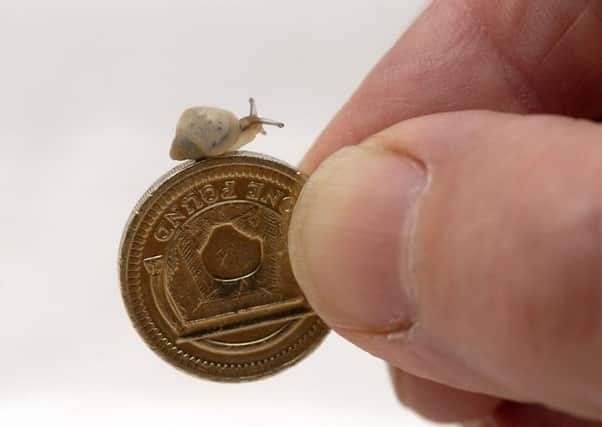Rare snails freed in Tahiti in bid to halt extinction


Scottish scientists are helping deliver an unusual cargo to islands in French Polynesia as part of a drive to restore populations of rare tree snails which had become extinct in the wild.
A team from the Royal Zoological Society of Scotland (RZSS) has been collaborating in a global breeding programme to provide 10,000 snails for what is one of the world’s largest ever reintroduction initiatives.
Advertisement
Hide AdAdvertisement
Hide AdThe project, which is being co-ordinated by the Zoological Society of London (ZSL), will see critically endangered Partula snails returned to their former native territory in Moorea and Tahiti in the Society Islands.
Partula snails were once abundant across the islands, but many species were virtually wiped out in the 1980s and 1990s after falling victim to a predatory alien snail. The rosy wolf snail was introduced in an effort to eradicate invading African giant land snails but preferred the tiny natives.
One species, known as the Navenave snail, had vanished completely in the wild.
The reintroductions coincide with the 250th anniversary of Captain James Cook’s expedition to the South Seas, which saw Partula snails collected for the first time.
Gareth Bennett, from RZSS’s Edinburgh Zoo, is currently in Tahiti helping to release the captive-bred snails.
Jo Elliott, animal collection manager at Edinburgh Zoo, said: “We are proud to breed Partula snails and help restore them back into their native habitat. This is a wonderful conservation success story and really helps to highlight the important role that zoos play in protecting species against extinction.”
Paul Pearce-Kelly, curator of invertebrates at ZSL, added: “I believe, through the collaborative efforts of the international zoo community and French Polynesian government environmental agencies, this major conservation initiative has an excellent chance of saving these fascinating species.”
The projects shows zoos can be a “powerhouse for conservation”, according to Dr Kirsten Pullen, chief executive of the British and Irish Association of Zoos and Aquariums.
Advertisement
Hide AdAdvertisement
Hide Ad“Opportunities for the successful reintroduction of endangered species are dependent on cooperation between many different bodies,” she said.
“Zoos are a part of the jigsaw and provide the expertise in managing the populations of these snails back to sustainable levels. The experiences our zoos have gained from this work can easily be applied to other species and situations.”